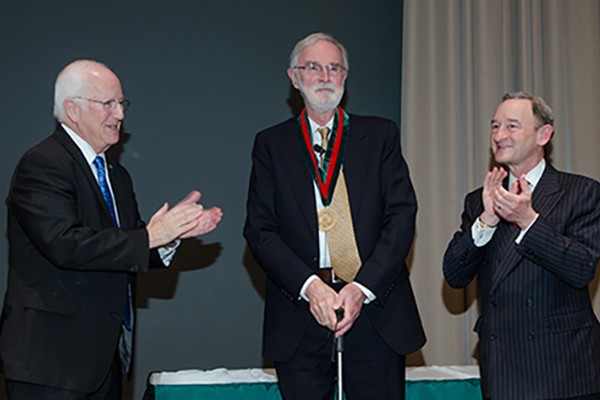Raichle named Wolff Distinguished Professor of Medicine
Marcus E. Raichle, MD, has been named an inaugural Alan A. and Edith L. Wolff Distinguished Professor of Medicine at the School of Medicine. A professor of radiology, psychology, biomedical engineering, neurobiology and neurology, his many honors include the 2014 Kavli Prize for Neuroscience.
Raichle awarded Kavli Prize in Neuroscience
Marcus E. Raichle, MD, a Washington University professor internationally renowned for his contributions to advancing the frontiers of cognitive neuroscience, is one of three scientists awarded this year’s prestigious Kavli Prize in Neuroscience.
Speedier scans reveal new distinctions in resting and active brain
A boost in the speed of brain scans is unveiling new
insights into how brain regions work with each other in cooperative
groups called networks. Shown is the study’s senior researcher, Maurizio Corbetta, MD.
Alzheimer’s breaks brain networks’ coordination
Scientists at Washington University School of Medicine
in St. Louis have taken one of the first detailed looks into how
Alzheimer’s disease disrupts coordination among several of the brain’s
networks.
Multiple sclerosis research links brain activity to sharper cognitive decline
When it comes to communication in the brain, more is usually better. But now scientists, including Maurizio Corbetta, MD, have linked increased communication in a network of brain regions to more severe mental impairment in patients with early-stage multiple sclerosis (MS).
Cells talk more in areas Alzheimer’s hits first, boosting plaque component
Higher levels of cellular chatter boosts levels of amyloid beta in the brain regions that Alzheimer’s hits first, researchers at Washington University School of Medicine in St. Louis report. Amyloid beta is the main ingredient of the plaque lesions that are a hallmark of Alzheimer’s. The finding may help explain why areas that are most active when the brain rests are often among the first to develop these plaques, according to the researchers.
Raichle receives MetLife Award for Alzheimer’s research
Marcus E. Raichle, MD, professor of radiology, of neurobiology and of neurology in the School of Medicine, received a MetLife Foundation Award for Medical Research in Alzheimer’s Disease Feb. 24 in New York. Raichle has been producing brain imaging research contributing to the way Alzheimer’s is now diagnosed and treated for nearly 40 years.
MRI scans reveal brain changes in people at genetic risk for Alzheimer’s
People with a known, high risk for Alzheimer’s disease develop abnormal brain function even before the appearance of telltale, amyloid plaques that are characteristic of Alzheimer’s disease, according to a new study from researchers at Washington University School of Medicine in St. Louis. The findings suggest that a gene variant affects brain function long before the brain begins accumulating the amyloid that will eventually lead to dementia.

